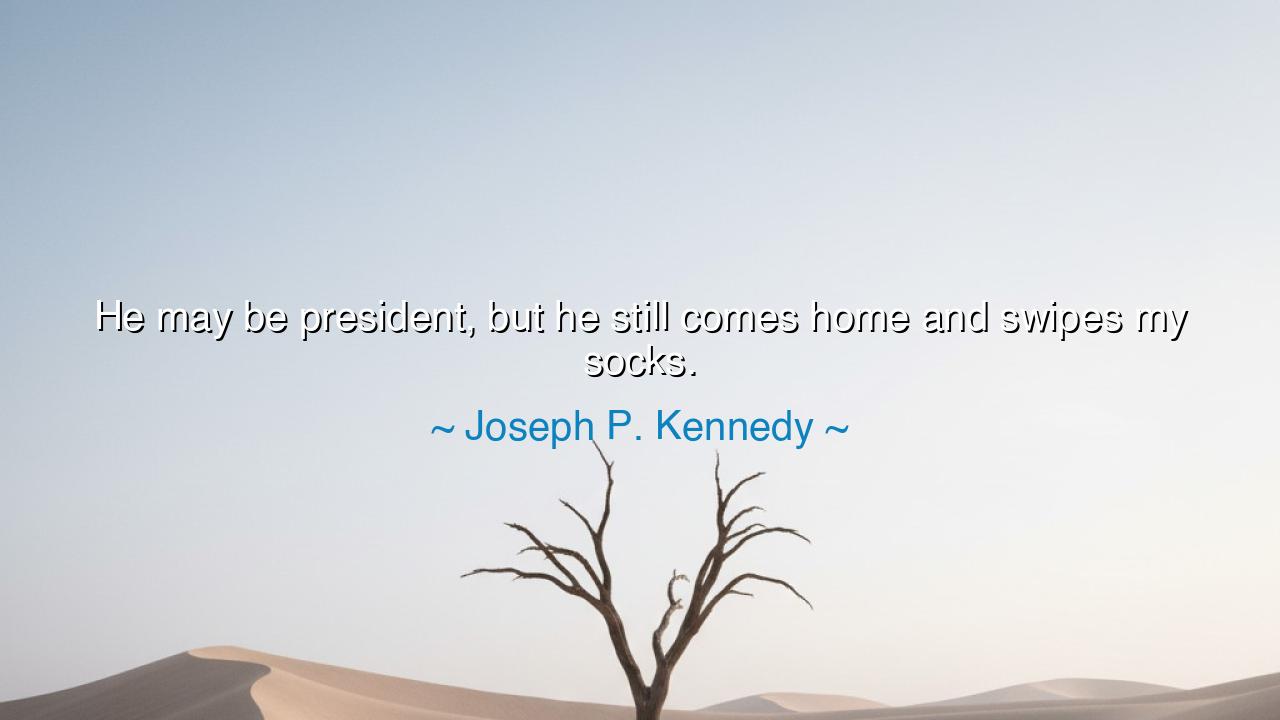
He may be president, but he still comes home and swipes my socks.






“He may be president, but he still comes home and swipes my socks.” Thus spoke Joseph P. Kennedy, father of a dynasty, in affectionate jest toward his son, John F. Kennedy, the thirty-fifth President of the United States. On the surface, the words seem simple, humorous even — a father teasing his son, who, though burdened with the weight of nations, remains the same mischievous boy at heart. Yet within this jest lies a profound truth, one that has echoed through the ages: that greatness, however vast, cannot erase our humanity. Beneath every crown and title, beneath every achievement, there remains the child, the son, the daughter — the small, imperfect being who longs for warmth, belonging, and familiarity.
When Joseph Kennedy said these words, the world saw his son as the embodiment of modern heroism — a leader of poise, intellect, and vision. Yet in the privacy of family, he was still “Jack,” the boy who once ran barefoot through the halls, borrowing what was not his, laughing freely in the company of kin. The image of the President stealing socks from his father is both comical and deeply human. It reminds us that the highest honors do not unmake the ordinary person within; they only drape them in responsibility. Even the mighty, when stripped of ceremony, return to the simplicity of love and domestic imperfection.
The ancients, too, spoke often of this truth. The philosopher Marcus Aurelius, emperor of Rome and ruler of men, would write in his journals at night not of conquest or glory, but of his daily faults — of anger, impatience, and pride. Though emperor of the known world, he reminded himself that he was “but a man among men.” Like Kennedy, he understood that the soul does not change its essence because the world has changed its gaze. The father who remembers the child behind the crown, as Joseph Kennedy did, holds the wisdom of the ages: that power without humility is illusion, and that love is the truest equalizer.
The image of swiping socks carries another layer of meaning — that of affection hidden in familiarity. For what is family, if not the space where greatness is tempered by laughter, and where even the most exalted are reminded of their roots? The world outside may bow in awe, but at home, one must earn respect anew each day. Joseph Kennedy’s words teach us that love thrives not in reverence, but in remembrance — the remembrance that no matter how high one climbs, they were once carried on another’s shoulders.
Consider also the story of Alexander the Great, who, after conquering empires, returned home and wept — not for lost battles, but for the distance between himself and the simplicity of his youth. In his quest to rule the world, he lost touch with the child who once dreamed beside his teacher, Aristotle. Like Kennedy, he had become a symbol rather than a son, a myth rather than a man. How fortunate, then, was John F. Kennedy, to have a father who could still see him not as a symbol of power, but as a son — capable of greatness, yet still delightfully human in his small, familiar habits.
Joseph P. Kennedy’s wisdom, though wrapped in humor, carries the weight of timeless truth: that love and humility anchor us when fame and power tempt us to drift. To those who rise in life — who earn wealth, titles, or renown — this quote is a gentle reminder: remember who you are when the applause fades. Return often to the places and people who remind you of your beginnings. Let your heart remain rooted in the soil from which it grew, for only there will it stay nourished and alive.
And so, my children, let this lesson be known: no matter what station you achieve, be it ruler or scholar, artist or laborer, never forget the small, ordinary joys that make you human. Laugh at yourself. Cherish those who knew you before the world did. Allow them to tease you, to humble you, to call you back to simplicity. For it is in such laughter — in the father’s teasing, in the child’s unguarded smile — that we touch eternity.
Thus, Joseph P. Kennedy’s words endure not as jest alone, but as scripture of humility. The son may be President, yet still he is son. The world may honor your achievements, yet those who love you will measure you by kindness, not crowns. And if one day, after all your victories, you still find yourself reaching into the drawer of someone dear, borrowing their socks — then rejoice. For you have remembered the secret of true greatness: that the heart remains humble, and the soul remains home.






AAdministratorAdministrator
Welcome, honored guests. Please leave a comment, we will respond soon